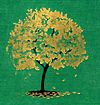

The novelist Ross Lockridge, Jr. was born April 25, 1914 in Bloomington, Indiana, youngest of four siblings.
His father was known as Mr. Indiana for his books on Indiana history and his "historic cite recitals," in which he gave dramatic orations on the very spots where famous Hoosiers had done their heroic deeds.
His mother was one of the first to embrace the Montessori teaching methods, used in home schooling and a kindergarten.
Ross Jr. began his writing career at age eight with a quest romance, The Demon with the Fiery Tongue, whose hero cheerfully slays his brothers.
His father leaned on him heavily throughout his earlier years, dictating books to this son who had won a state-wide shorthand competition. What his father didn't know was that Ross Jr. had determined early on to write a book of his own, nothing less than the Great American Novel.
Known around the Indiana University campus as "A Plus Lockridge," he won a scholarship abroad for his junior year at the Sorbonne. In voluminous letters home he discovered a writer's voice and decided his projected novel would be based on his mother Elsie's side of the family.
Shortly after graduating with the highest grade point average ever tallied at the university, he was bed-fast for a year with scarlet fever. He was cared for by his mother and his high school sweetheart, Vernice Baker, whom he married upon recovery.
While teaching in the English department and beginning a family, he detoured from fiction and knocked out a 400-page epic poem, The Dream of the Flesh of Iron. This was a book of nightmares narrating the Great War and the period leading up to World War II. The disease of materialism is its central metaphor and it makes for some fairly unpleasant reading. With no hope of publication he cast the draft aside and began in earnest the novel he had in mind to write. He had typed up some 2,000 pages when he had a sudden recognition that his strongest characters were the old folks, especially his maternal grandfather, John Shockley, a deceased Hoosier schoolmaster. He abruptly turned the manuscript over, switched the era from the twentieth to the nineteenth century, and began writing Raintree County, itself a 2,000 page manuscript within a couple of years.
Lockridge borrowed from Joyce's Ulysses the idea of structuring the novel around a single day, in his case July 4, 1892. But Lockridge felt that Joyce's novel, which he deeply admired in other respects, was inaccessible to the common reader. "The emotions are there" he wrote, "but not for the reader, who is too busy deciphering." He wished to write a great novel that was also a page-turner.
Such was his confidence that he wasn't surprised by an acceptance at Houghton Mifflin of the twenty-pound manuscript he left in a battered suitcase in their lobby, April 24, 1946, the day before his thirty-second birthday. Nor was he surprised to get the most lucrative movie contract ever from MGM, to have his novel become the Main Selection at Book-of-the-Month Club, and to have it excerpted in Life magazine. But unknown to the public, Lockridge was a deeply suffering person, having exhausted himself in writing and revising the novel, having been in a bitter dispute with Houghton Mifflin over how to split up the MGM spoils, and feeling intense stage fright as publication day drew closer.
Entering an Indianapolis hospital under an assumed name, he underwent electroconvulsive therapy for depression, leaving the hospital a day before his novel was published on January 5, 1948, the same day his neighbor Alfred Kinsey published Sexual Behavior in the Human Male. Raintree County was hailed by many as a spiritual testament ending a long slump in American fiction; the Times reviewer called it "an achievement of art and purpose, a cosmically brooding book full of significance and beauty." But the thirty-three-year old author heard only the pans complaining of obscenity and blasphemy. The evening of March 6, 1948, just as Raintree County became the nation's number one best-seller, he took his own life by carbon monoxide poisoning in the family garage, leaving his wife and four children. His obituary was carried on the first page of the New York Times.
Herman Wouk has written a foreword to a recent edition of Raintree County and tells of a time when, upon rereading the novel, he had an impulse to write a literary critique "to be called 'He Came, and Ye Knew Him Not.' By him I meant the author of 'the great American novel.' For I realized in that reading," says Wouk, "that Ross Lockridge had pursued and--insofar as he could--captured the phantom prize he was really after..."
To: An extended Synopsis on Ross Lockridge, Jr

To: The Biography Shade of the Raintree by Larry Lockridge To: RaintreeCounty.com March 14, 2008 / Sept. 2016